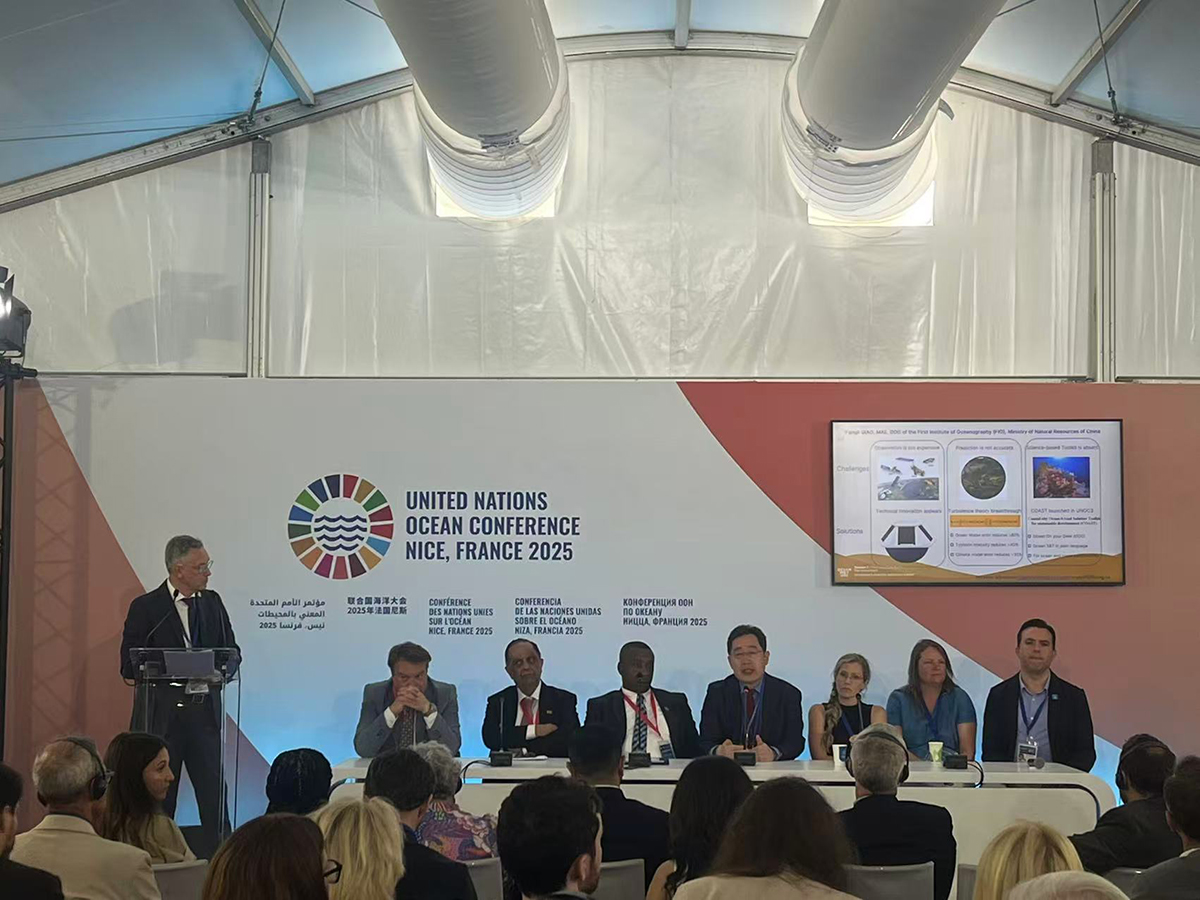On June 7, 2025, the special session of the 3rd United Nations Ocean Conference — Summit of the Rising Seas and Coastal Resilience Alliance — was held in Nice, France. Over 200 mayors and administrators from major coastal cities worldwide gathered to explore sustainable development pathways for coastal cities in the face of climate change. Backed by a series of original scientific innovations from China, and jointly developed by the FIO-led research team and multiple international partners, the Coastal city Ocean-bAsed Solution Toolkit for sustainable development (COAST) — a global ocean governance toolkit — was officially launched.
Developing an Integrated Ocean Governance Toolkit Based on Original Scientific Achievements
As the cradle of life on Earth, the ocean has long driven the sustainable development of human society. However, marine heat accumulation due to climate change, ecosystem degradation, resource overexploitation, and increasingly severe marine disasters are posing major challenges to sustainable ocean and human development. The Ocean Decade initiative by the United Nations has emphasized the urgency of global ocean governance. The Ocean Decade seeks to shift marine science from basic research toward actionable solutions, with the development of science-based governance toolkits becoming a central task.
Against this backdrop, the COAST toolkit — developed jointly by the Decade Collaborative Center on Ocean-Climate Nexus and Coordination Amongst Decade Implementing Partners in P.R. China (DCC-OCC) and the Ocean Decade's program on ocean-climate seamless forecasting (OSF) — was officially released. COAST adopts a co-design, co-development, and co-benefit approach and is freely available to global users. Its ultimate goal is to enable rapid, seamless knowledge transfer from ocean science to the public and policymakers, providing cost-effective, science-based solutions for diverse ocean management needs, particularly for challenges facing sustainable development in coastal cities.
The success of COAST is rooted in a series of theoretical and technological breakthroughs. Groundbreaking work in turbulence theory and innovations in ocean observation technology by Chinese scientists laid the foundation for this intelligent governance toolkit. COAST consists of six core modules and 24 submodules, covering key areas including ocean-climate early warning, maritime safety, coastal ecosystem health, integrated coastal zone management, blue economy support, and ocean literacy. It integrates ocean big data, advanced numerical models, AI technologies, and capacity building to deliver visualized products and services on marine disasters, ecosystem health, fisheries, and ocean education to end users and decision-makers in coastal cities. The application of COAST will provide strong technological support for the construction of a Maritime Silk Road and an ocean-oriented national development strategy.
Deep Participation in the Ocean Decade: Bridging Science and Governance
To achieve SDG 14, the United Nations launched the landmark Ocean Decade initiative — the largest and most influential global marine science campaign to date — aimed at delivering transformative ocean science solutions and transitioning from “the ocean we have” to “the ocean we want.” Unlike traditional marine science cooperation that focuses purely on research, the Ocean Decade emphasizes actionable solutions, policy integration, interdisciplinary collaboration, and inclusive engagement.
From the outset, Chinese scientists have been deeply involved in this global initiative, responding to international needs with scientific innovation. At the strategic level, Chinese experts have served in core decision-making bodies such as the Executive Planning Group (EPG) and the Decade Advisory Board (DAB)。 At the institutional level, the DCC-OCC, co-led by FIO and international experts, remains the only global collaborative center in Asia. It coordinates major international ocean-climate science programs and has built a globally influential platform for public goods, elevating China’s participation in global ocean governance.
At the scientific implementation level, China-led programs like OSF have brought together scientific forces from over 50 countries to enhance global ocean governance through original innovation. The COAST toolkit represents a collective achievement of Chinese scientists deeply engaged in the Ocean Decade. In the Qingdao Declaration released at the first Ocean Decade Coastal Cities Conference (co-hosted by UNESCO/IOC and Qingdao in 2025), the international community explicitly recognized the global need for science-based governance toolkits to tackle climate change and enhance coastal resilience. COAST emerged in this context as a comprehensive and precise Chinese contribution to international society, serving as a bridge between ocean science and governance practices.
Presenting Scientific Ocean Governance Solutions at the UN Ocean Conference
Amid the growing crisis of climate change and marine ecosystem degradation, the international community has increasingly recognized the centrality of ocean health and sustainable use in achieving sustainable development. Implementation of SDG 14 continues to face significant challenges, requiring urgent global cooperation.
The 3rd United Nations Ocean Conference, themed “Accelerating Action, Uniting Efforts, and Protecting and Sustainably Using the Ocean Together,” brought 15,000 participants from around the world to Nice, France, for global dialogue on ocean governance. In addition to plenary sessions, the conference featured three special events, 130 official side events, and many offsite activities. On June 7, one of the three special sessions — Summit of the Rising Seas and Coastal Resilience Alliance — convened to address sea-level rise under the UN framework. During this summit, the COAST toolkit was formally introduced to the world as a core outcome.
Researcher Qiao Fangli, Deputy Director of FIO and Director of DCC-OCC, delivered a keynote presentation. COAST's scientific rigor and practical utility help decision-makers assess risks and optimize coastal planning, enhancing resilience. Participants expressed strong interest in adopting COAST in their own countries and actively discussed potential partnerships. With formal approval from the conference, a dedicated side event focusing on COAST will be held on June 10 in the UN Ocean Conference Blue Zone.
The release of the COAST toolkit demonstrates China's commitment to global ocean governance and building a shared future for the ocean. Moving forward, the research team will continue working with the international community, driven by scientific innovation and guided by open collaboration, to refine COAST and expand its global application — contributing further to sustainable ocean development worldwide.

Qiao Fangli, Director of DCC-OCC, attended the thematic session of the special event at the 3rd United Nations Ocean Conference and delivered an invited speech.